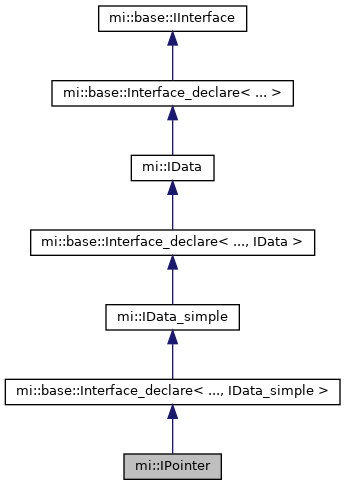This interface represents mutable pointers. More...
#include <ipointer.h>

Public Member Functions | |
| virtual Sint32 | set_pointer (base::IInterface *pointer)=0 |
| Sets the pointer. More... | |
| virtual base::IInterface * | get_pointer () const =0 |
| Returns the pointer. More... | |
| template<class T> | |
| T * | get_pointer () const |
| Returns the pointer. More... | |
 Public Member Functions inherited from mi::IData Public Member Functions inherited from mi::IData | |
| virtual const char * | get_type_name () const =0 |
| Returns the type name. More... | |
 Public Member Functions inherited from mi::base::IInterface Public Member Functions inherited from mi::base::IInterface | |
| virtual Uint32 | retain () const =0 |
| Increments the reference count. More... | |
| virtual Uint32 | release () const =0 |
| Decrements the reference count. More... | |
| virtual const IInterface * | get_interface (const Uuid &interface_id) const =0 |
| Acquires a const interface from another. More... | |
| template<class T> | |
| const T * | get_interface () const |
| Acquires a const interface from another. More... | |
| virtual IInterface * | get_interface (const Uuid &interface_id)=0 |
| Acquires a mutable interface from another. More... | |
| template<class T> | |
| T * | get_interface () |
| Acquires a mutable interface from another. More... | |
| virtual Uuid | get_iid () const =0 |
| Returns the interface ID of the most derived interface. More... | |
Additional Inherited Members | |
 Public Types inherited from mi::base::Interface_declare< 0xd921b94b, ... > Public Types inherited from mi::base::Interface_declare< 0xd921b94b, ... > | |
| typedef Interface_declare< id1, ... > | Self |
| Own type. More... | |
| typedef Uuid_t< id1, ... > | IID |
| Declares the interface ID (IID) of this interface. More... | |
 Public Types inherited from mi::base::Interface_declare< 0xc33c5a05, ... > Public Types inherited from mi::base::Interface_declare< 0xc33c5a05, ... > | |
| typedef Interface_declare< id1, ... > | Self |
| Own type. More... | |
| typedef Uuid_t< id1, ... > | IID |
| Declares the interface ID (IID) of this interface. More... | |
 Public Types inherited from mi::base::Interface_declare< 0x2e5f84bc, ... > Public Types inherited from mi::base::Interface_declare< 0x2e5f84bc, ... > | |
| typedef Interface_declare< id1, ... > | Self |
| Own type. More... | |
| typedef Uuid_t< id1, ... > | IID |
| Declares the interface ID (IID) of this interface. More... | |
 Public Types inherited from mi::base::IInterface Public Types inherited from mi::base::IInterface | |
| typedef Uuid_t<0, 0, 0, 0, 0, 0, 0, 0, 0, 0, 0> | IID |
| Declares the interface ID (IID) of this interface. More... | |
 Static Public Member Functions inherited from mi::base::Interface_declare< 0xd921b94b, ... > Static Public Member Functions inherited from mi::base::Interface_declare< 0xd921b94b, ... > | |
| static bool | compare_iid (const Uuid &iid) |
Compares the interface ID iid against the interface ID of this interface and of its ancestors. More... | |
 Static Public Member Functions inherited from mi::base::Interface_declare< 0xc33c5a05, ... > Static Public Member Functions inherited from mi::base::Interface_declare< 0xc33c5a05, ... > | |
| static bool | compare_iid (const Uuid &iid) |
Compares the interface ID iid against the interface ID of this interface and of its ancestors. More... | |
 Static Public Member Functions inherited from mi::base::Interface_declare< 0x2e5f84bc, ... > Static Public Member Functions inherited from mi::base::Interface_declare< 0x2e5f84bc, ... > | |
| static bool | compare_iid (const Uuid &iid) |
Compares the interface ID iid against the interface ID of this interface and of its ancestors. More... | |
 Static Public Member Functions inherited from mi::base::IInterface Static Public Member Functions inherited from mi::base::IInterface | |
| static bool | compare_iid (const Uuid &iid) |
Compares the interface ID iid against the interface ID of this interface. More... | |
This interface represents mutable pointers.
Mutable pointers in the sense of this interface are mutable interface pointers, not void* pointers.
Pointers are either typed or untyped. Typed pointers enforce the target to be of a certain type derived from mi::IData. The type name of a typed mutable pointer is "Pointer<", followed by the type name of the target, and finally ">", e.g., "Pointer<Sint32>" for a mutable pointer to an instance of mi::ISint32.
Untyped pointers simply store a mutable pointer of type mi::base::IInterface. The type name of an untyped mutable pointer is "Pointer<Interface>".
The additional level of indirection can be used to use mutable interface pointers with data collections while maintaining const correctness. E.g., the getters of mi::IData_collection, mi::IArray, mi::IDynamic_array, and mi::IMap return const interface pointers if the instance itself is const. If you want to retrieve a mutable interface pointer from such a collection you have to wrap it in an instance of mi::IPointer before you store it. When you retrieve it from the const collection, you can call get_pointer() to obtain the wrapped mutable interface pointer.
|
inline |
Returns the pointer.
This templated member function is a wrapper of the non-template variant for the user's convenience. It eliminates the need to call mi::base::IInterface::get_interface(const Uuid&) on the returned pointer, since the return type already is a pointer to the type T specified as template parameter.
| T | The interface type of the element to return |
|
pure virtual |
Returns the pointer.
|
pure virtual |
Sets the pointer.
Note that a NULL pointer is a valid parameter value that clears the previously set pointer. Subsequent get_pointer() calls will return NULL then.
pointer has the wrong type.